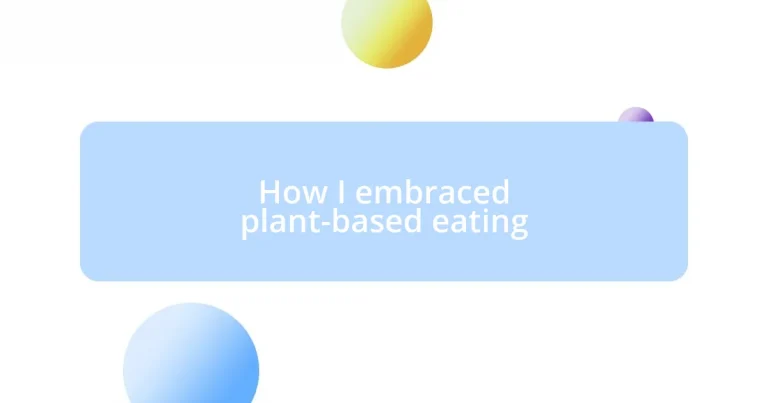Key takeaways:
- Plant-based eating is a lifestyle centered on whole, unprocessed foods, leading to increased energy, better digestion, and lower risk of chronic diseases.
- Overcoming initial challenges, such as social isolation and misconceptions about variety, fosters creativity in cooking and encourages community support.
- Meal prepping becomes a cherished practice, enhancing enjoyment and mindfulness in food preparation, while building a connection to sustainable food sources.
- Maintaining a balanced diet includes intentional ingredient swaps and keeping a food journal to reflect on dietary choices and their impact on well-being.

Understanding plant-based eating
Plant-based eating goes beyond simply avoiding meat; it’s a lifestyle that revolves around whole, unprocessed foods, primarily fruits, vegetables, grains, legumes, nuts, and seeds. I remember the first time I truly understood this concept; I noticed how vibrant and alive I felt after eating a colorful salad packed with fresh ingredients. Has there ever been a meal that made you feel more energized than anything else?
What often surprises people is how satisfying and diverse plant-based meals can be. For me, trying a creamy cashew Alfredo sauce for the first time was a game-changer. It made me realize that switching to a plant-based diet doesn’t mean sacrificing flavor or comfort. Instead, it opens up a world of culinary creativity that I never anticipated.
In my experience, embracing plant-based eating has required a shift in mindset. It’s not merely about what you exclude from your diet, but rather what you choose to include. I’ve found that this new approach challenges me to explore foods I used to overlook and encourages a deeper connection to what I eat. Isn’t it fascinating how food can affect our well-being on such a profound level?
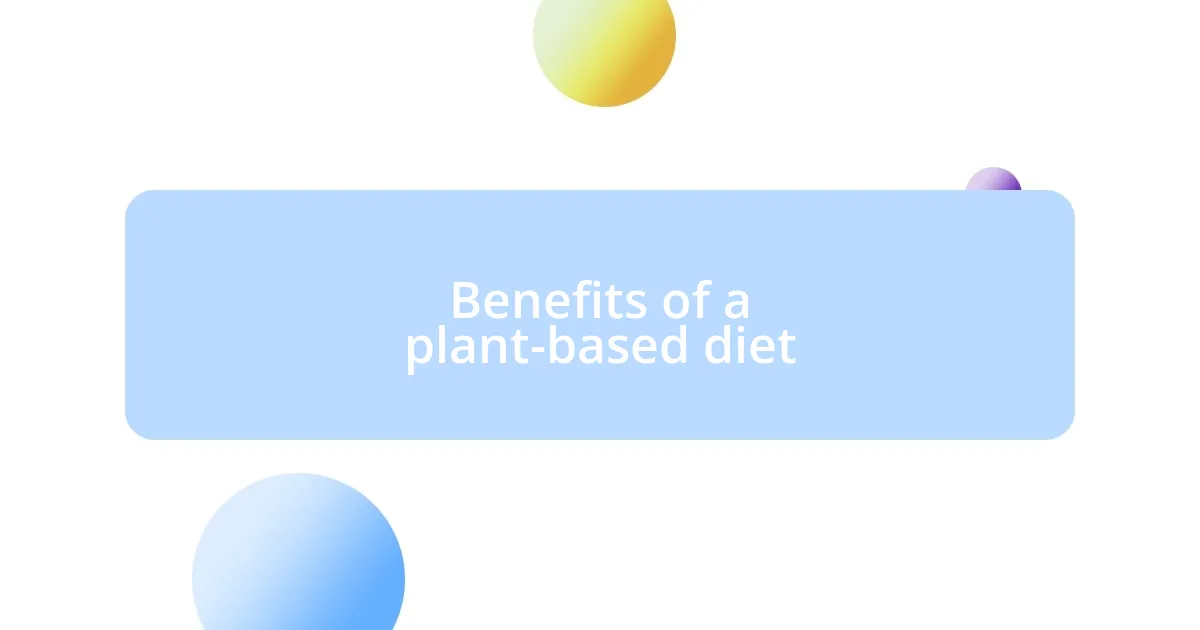
Benefits of a plant-based diet
Adopting a plant-based diet has brought a slew of benefits that I didn’t fully appreciate until I dove in. One standout for me has been my energy levels; I often find myself feeling more alert and focused throughout the day. It’s amazing how replacing heavy, processed foods with nutritious, whole foods can make such a difference. I’ve also noticed my digestion has improved significantly. Remember that feeling of sluggishness after a big meal? Now, I often finish my meals feeling light and satisfied, not stuffed.
Here are some key benefits I’ve encountered:
- Increased Energy: Whole foods fuel the body better, reducing that post-meal lethargy.
- Better Digestion: A higher intake of fiber from fruits and veggies supports a healthy gut.
- Weight Management: Plant-based foods are often lower in calories, making it easier to maintain a healthy weight.
- Lower Risk of Chronic Diseases: Research shows a plant-based diet can reduce risks associated with heart disease, diabetes, and certain cancers.
- Environmental Impact: My choices feel purposeful, contributing to a more sustainable planet.
I still remember those first few weeks – I felt like I was on a journey rather than just making a dietary change. I even found myself looking forward to meal prep on Sundays, excited to explore new flavors and textures. There’s something truly fulfilling about nourishing my body with wholesome ingredients, and I often can’t help but share my favorite recipes with friends. It’s not just about the food; it’s about the community and connection that comes with embracing this lifestyle.
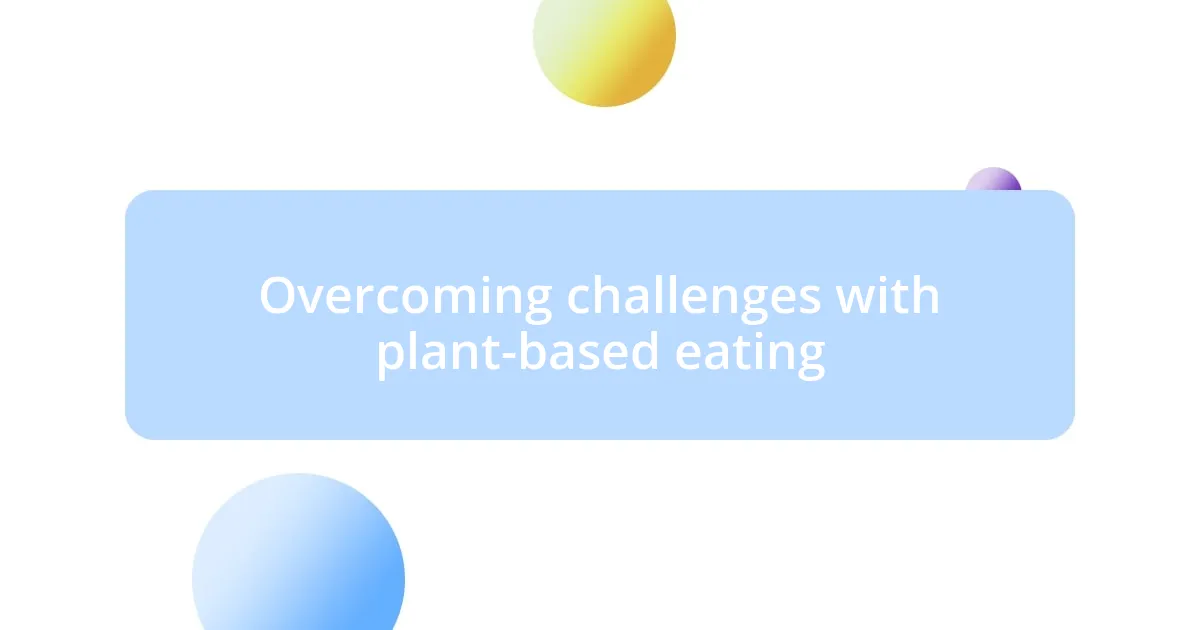
Overcoming challenges with plant-based eating
Overcoming challenges with plant-based eating has been a rewarding experience, albeit not without its hurdles. One significant challenge for me was feeling socially isolated when dining out or attending gatherings. Initially, I worried that my food choices would alienate me from friends and family. However, I learned to communicate my dietary preferences openly, and to my surprise, many loved ones became curious about what I was eating. I remember one memorable dinner party where I brought a vibrant quinoa salad; it sparked discussions and even inspired friends to try plant-based meals themselves!
Another common obstacle is the misconception that plant-based diets lack variety. I used to think that constantly eating salads would become tedious. But after experimenting in my kitchen, I discovered an array of delectable dishes, from spicy lentil tacos to rich coconut curry. This journey reminded me that creativity in the kitchen could reignite my passion for cooking. Have you ever felt stuck in a recipe rut? I certainly have. But by seeking out new spices and ingredients that I had never used before, I transformed my meals into exciting culinary adventures.
When it comes to nutrition, many are concerned about meeting their protein needs on a plant-based diet. I felt the same way at first, but I quickly learned about the wealth of plant protein sources available. I started incorporating beans, lentils, and even chia seeds into my meals. One time, I made a protein-packed smoothie with frozen spinach and hemp seeds, and it was absolutely delicious—not to mention nourishing. The more I educated myself about plant-based nutrition, the more confident I became in my choices, proving to myself that a balanced and fulfilling diet could be entirely plant-based.
| Challenge | Solution |
|---|---|
| Social Isolation | Open communication about my dietary preferences led to curiosity and support from friends. |
| Lack of Variety | Experimenting with new recipes and ingredients turned mundane meals into exciting culinary adventures. |
| Protein Concerns | Educating myself on plant protein sources helped me create nutritionally balanced meals. |
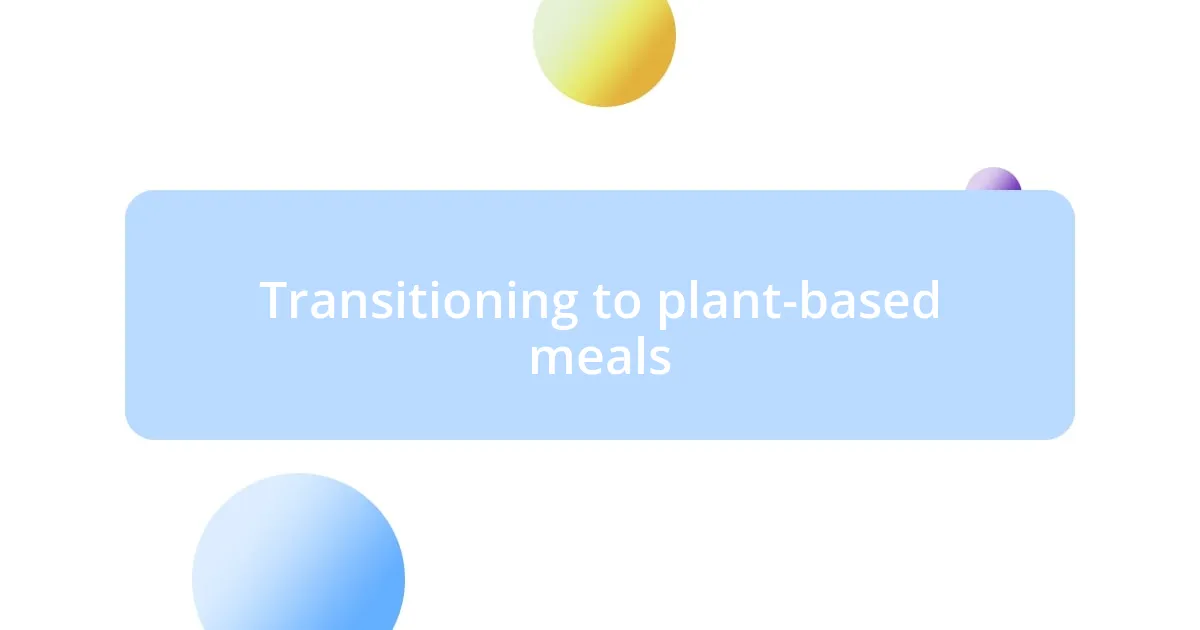
Transitioning to plant-based meals
Transitioning to plant-based meals isn’t merely a shift in what you eat; it’s a delightful exploration of new flavors and experiences. I still vividly remember the excitement of my first grocery haul focused entirely on fruits, vegetables, and grains. Walking through the produce aisle, the vibrant colors and fresh scents ignited a sense of curiosity in me. Have you ever experienced that spark of joy while shopping for food? It’s undeniably invigorating, and it set the stage for the culinary adventures that lay ahead.
Now, one key aspect of this transition for me was gradually swapping out familiar ingredients instead of going cold turkey. I started by replacing dairy milk with almond milk in my morning smoothies. Initially, I was hesitant—would it taste too different? But when I took that first sip and tasted the creamy, nutty goodness, I knew I was onto something. This small change made it easier to embrace other alterations, like experimenting with veggie-based pasta instead of traditional noodles. Each swap felt like an exciting little victory along the way.
Meal prepping quickly became a ritual I cherished. Just the other day, while chopping up a rainbow of vegetables, I felt a sense of calm wash over me. It reminded me of painting: each ingredient was a brushstroke on my canvas. I learned that prepping not only saved time during the week but also renewed my excitement for meals ahead. Have you ever had that surge of enthusiasm from simply preparing your food? It’s like nurturing a small plant; the more care you give it, the more it flourishes. That’s exactly how I felt about my plant-based journey!
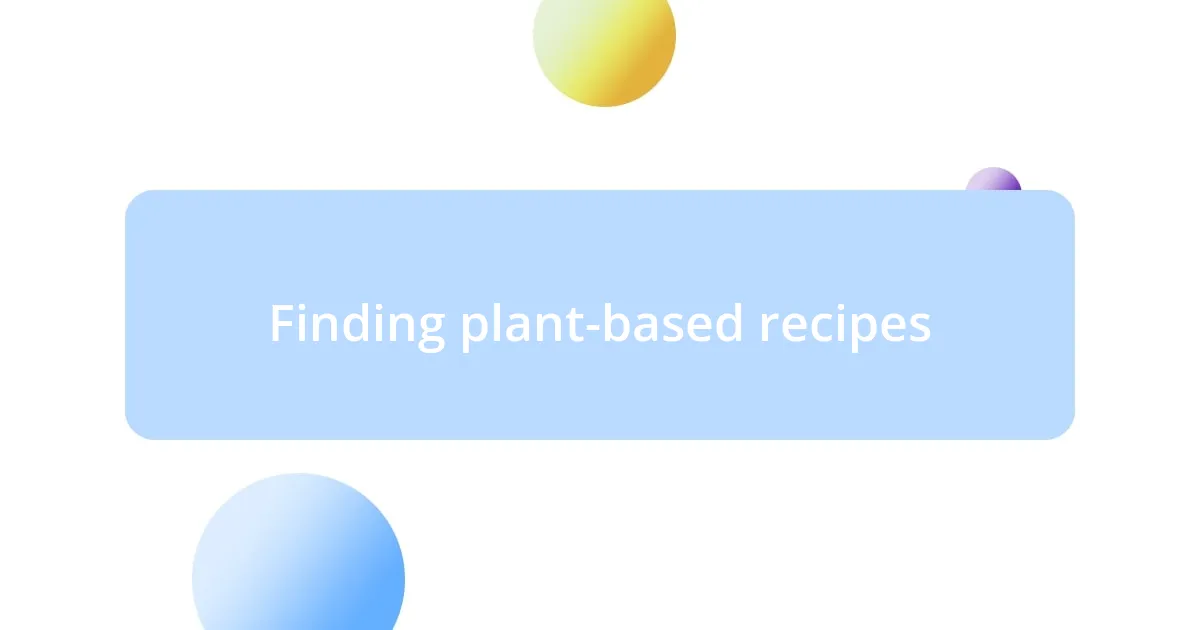
Finding plant-based recipes
Finding plant-based recipes was both a challenge and a delightful discovery. I vividly recall my first dive into the world of plant-based cooking. Sifting through cookbooks and browsing blogs, I was flooded with inspiration but also a bit overwhelmed. Have you ever been excited and intimidated at the same time? I found that when I focused on recipes that featured ingredients I already loved, such as sweet potatoes and chickpeas, I felt more confident in my cooking skills.
As I continued searching for new dishes, social media became my pantry of ideas. I started following food influencers who shared vibrant meal images and videos of their cooking techniques. One day, while scrolling through my feed, I stumbled upon a recipe for a creamy avocado pasta that knocked my socks off. The moment I tried making it, the combination of flavors was truly thrilling! I never imagined that avocados could transform a simple pasta dish into something so rich and decadent.
I also discovered an invaluable tip: local cooking classes. Just last month, I signed up for a workshop focused on plant-based meals, and it turned out to be a game-changer. Not only did I learn how to whip up aromatic curries and fresh salads, but the shared experience with fellow food enthusiasts sparked a sense of community. Have you noticed how cooking together can create lasting connections? It’s incredible how a simple meal can turn strangers into friends, all while exploring the wonders of plant-based eating.

Maintaining a balanced diet
Maintaining a balanced diet on a plant-based eating plan can sometimes feel like walking a tightrope. I’ll admit, early on, I occasionally found myself reaching for too many carbs, which didn’t make me feel my best. However, I learned to balance those comforting staples with a variety of colorful veggies, healthy fats, and proteins, like beans and lentils. Have you ever felt the difference in your energy levels after eating a well-rounded meal? It’s amazing how the right combination can fuel your body.
One of the surprising joys I discovered is how easy it is to eat in a way that nourishes not just my body but also my soul. For example, when I began incorporating more whole grains, like quinoa and brown rice, into my meals, I noticed my cravings shifted from processed snacks to hearty, wholesome dishes. When I sat down to a big bowl of stir-fried veggies with quinoa, there was this satisfying warmth that I cherished. I felt fulfilled and alert after meals, which was refreshing. Isn’t it fascinating how food can transform our mood?
I also found that keeping a food journal was incredibly beneficial. I started jotting down what I ate and how it made me feel afterward. One evening, after enjoying a bright chickpea salad loaded with fresh herbs and lemon, I noticed a lighter, brighter mood—just like the meal itself! Capturing those insights helped me understand which combinations worked for me and ensured I was getting the nutrients I needed. How often do you reflect on your meals? It’s a simple yet powerful tool that can help refine your approach to a balanced plant-based diet.

Long-term lifestyle changes
I realized that embracing plant-based eating wasn’t just a phase; it was a shift in how I viewed food and nutrition long-term. Initially, I thought it was all about substitutions, but over time, I found myself genuinely enjoying the creativity that came with plant-based meals. I recall a night when I decided to venture beyond my usual dishes, whipping up a vibrant vegetable paella that filled my kitchen with comforting aromas. It struck me then—this wasn’t just about replacing meat; it was about exploring flavors and textures in a way I had never imagined.
As I continued down this path, I started to notice subtle changes in my daily routine. Meal prepping became a cherished Sunday tradition. I would spend the afternoon chopping veggies and experimenting with spices, creating hearty stews for the week. It was a joy to know that I was not only saving time during busy evenings but also providing my body with nutrition that felt nourishing. Has meal prep ever felt like a meditative practice for you? It certainly did for me, turning a mundane task into a moment of mindfulness.
The long-term commitment to this lifestyle also encouraged me to engage more deeply with my food sources. I began visiting local farmers’ markets. Connecting with the farmers who grew my food made me feel grounded, like I was part of a larger community focused on sustainability. I vividly remember chatting with a farmer about heirloom tomatoes and feeling a sense of responsibility toward the environment with each purchase. It made me reflect on how my choices could impact not just my health, but the health of the planet, too. Isn’t that a powerful realization?












